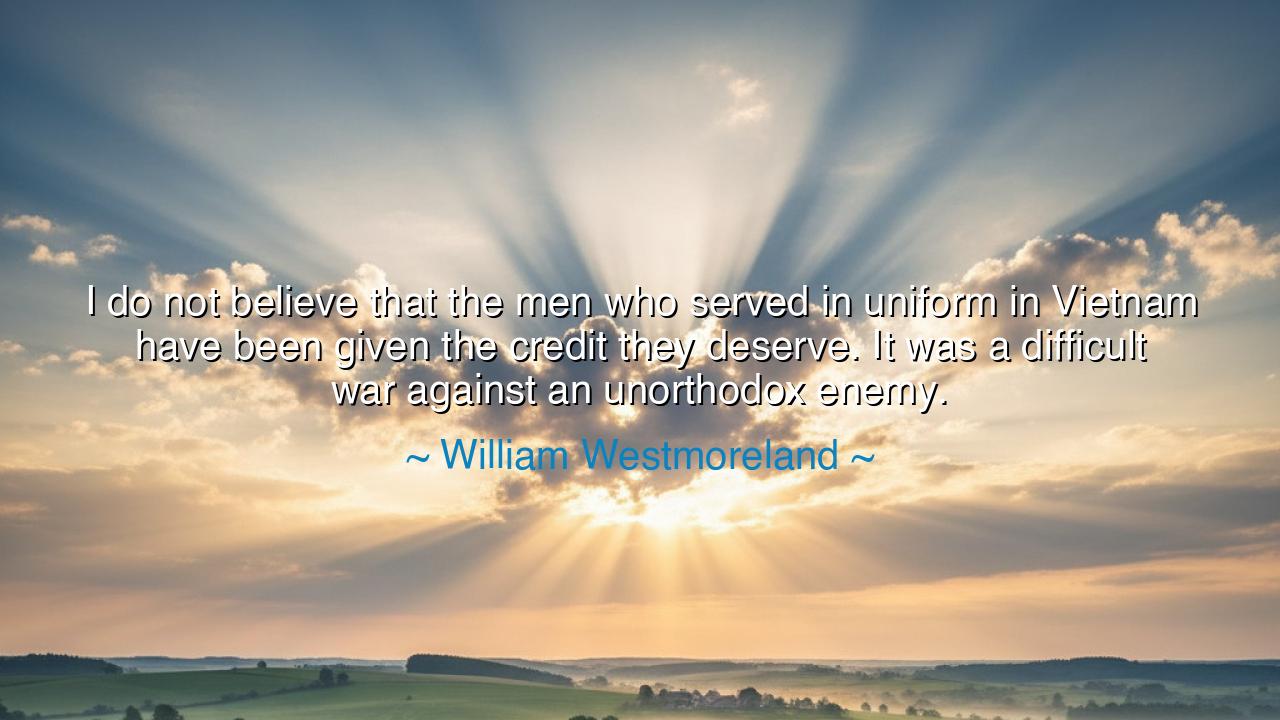
I do not believe that the men who served in uniform in Vietnam
I do not believe that the men who served in uniform in Vietnam have been given the credit they deserve. It was a difficult war against an unorthodox enemy.






Hear the words of General William Westmoreland: “I do not believe that the men who served in uniform in Vietnam have been given the credit they deserve. It was a difficult war against an unorthodox enemy.” These words are heavy with the weight of history, not spoken to glorify, but to remind. For the soldiers who fought in that distant land bore burdens few could understand, and yet, upon returning home, many found not honor but silence, not gratitude but scorn. The General’s lament is a call across the ages, urging us to remember those who endured a conflict unlike any before.
The Vietnam War was no clash of great armies upon open plains, no battle where lines were drawn clear between friend and foe. It was a jungle war, where the enemy struck from shadows, then vanished into the green depths. It was a struggle of ambushes, traps, and uncertainty, where courage was demanded not in grand charges, but in the weary march through unseen danger. The men who wore the uniform faced not only bullets, but confusion, isolation, and the gnawing sense that the land itself was hostile.
Yet upon their return, these soldiers found their service overshadowed by the controversies of politics. Many who opposed the war could not separate the deed from the doer, and so those who had borne the suffering were met not with respect but with reproach. Westmoreland saw this injustice clearly: the credit due to men who endured the impossible was withheld, and their sacrifices became lost beneath the debates of nations. He spoke not only for the soldiers of Vietnam, but for all who serve in wars where victory is unclear and gratitude is scarce.
Consider the story of the Battle of Ia Drang in 1965, the first major clash between American forces and the North Vietnamese Army. Surrounded and outnumbered, the men of the 1st Cavalry Division held their ground for days, fighting with valor against an unorthodox enemy who melted into the jungle even as he struck with ferocity. Though the battle proved the enemy could be met and resisted, it also revealed the long, grinding nature of the struggle ahead. These men, who faced death with unyielding courage, embody the very truth Westmoreland proclaimed — that their credit must not be forgotten.
And yet, beyond the battlefield, there is another lesson. Wars do not end with treaties alone; they linger in the hearts of those who fought. To withhold honor from such men is to deepen their wounds and dishonor their service. The ancients taught that warriors must be welcomed home, whether victorious or not, for their sacrifice is always real. The failure to do so is a failure of memory, a failure of community, a failure of justice.
So let us learn. When we speak of Vietnam, let us not speak only of the politics or the protests, but of the men who marched through jungles, who faced the invisible enemy, who carried one another through the storm. Let us give credit where it is due, not in empty words, but in care for the veterans who yet live, and in remembrance for those who fell.
The teaching is clear: honor those who serve, regardless of the outcome of the war. In your own life, practice gratitude — not only for soldiers, but for all who labor in silence, whose struggles are unseen and whose sacrifices go unpraised. Support the weary, acknowledge the overlooked, and lift up those whose work has been forgotten. For in this, we fulfill Westmoreland’s call, and ensure that the legacy of the men who fought in Vietnam — and of all who stand in difficult wars — will never be lost to silence.






NKPham Nam Khanh
I find it compelling that Westmoreland points out the lack of recognition for those who served in Vietnam. The war itself may have been controversial, but the soldiers on the ground were often left to carry the blame. What can we do to better honor veterans of all wars, ensuring they receive the respect and recognition they deserve for their sacrifices?
DMTam Dao Minh
Westmoreland’s quote brings up the complexity of the Vietnam War, where soldiers were pitted against an unconventional enemy in challenging conditions. It’s easy to focus on the war’s outcome, but the soldiers who fought deserve recognition for the personal and collective challenges they endured. Do you think we’ve moved past the stigma associated with Vietnam veterans, or is there still work to be done in acknowledging their contributions?
LVTri Le Van
This quote makes me reflect on the unfair treatment Vietnam veterans received after the war. While the political and social issues around the war were complex, the soldiers themselves were placed in an incredibly difficult situation. How do you think society should address the gap between how these men were treated and the recognition they deserved for their service?
TNThuy tien Ton nu
William Westmoreland’s statement highlights the often-overlooked struggles of soldiers who served in Vietnam. They fought an enemy that was unconventional, and yet their sacrifices are sometimes overshadowed by the controversies surrounding the war itself. What do you think—do we adequately recognize the challenges these soldiers faced, or are they still unjustly blamed for the political decisions made during the conflict?